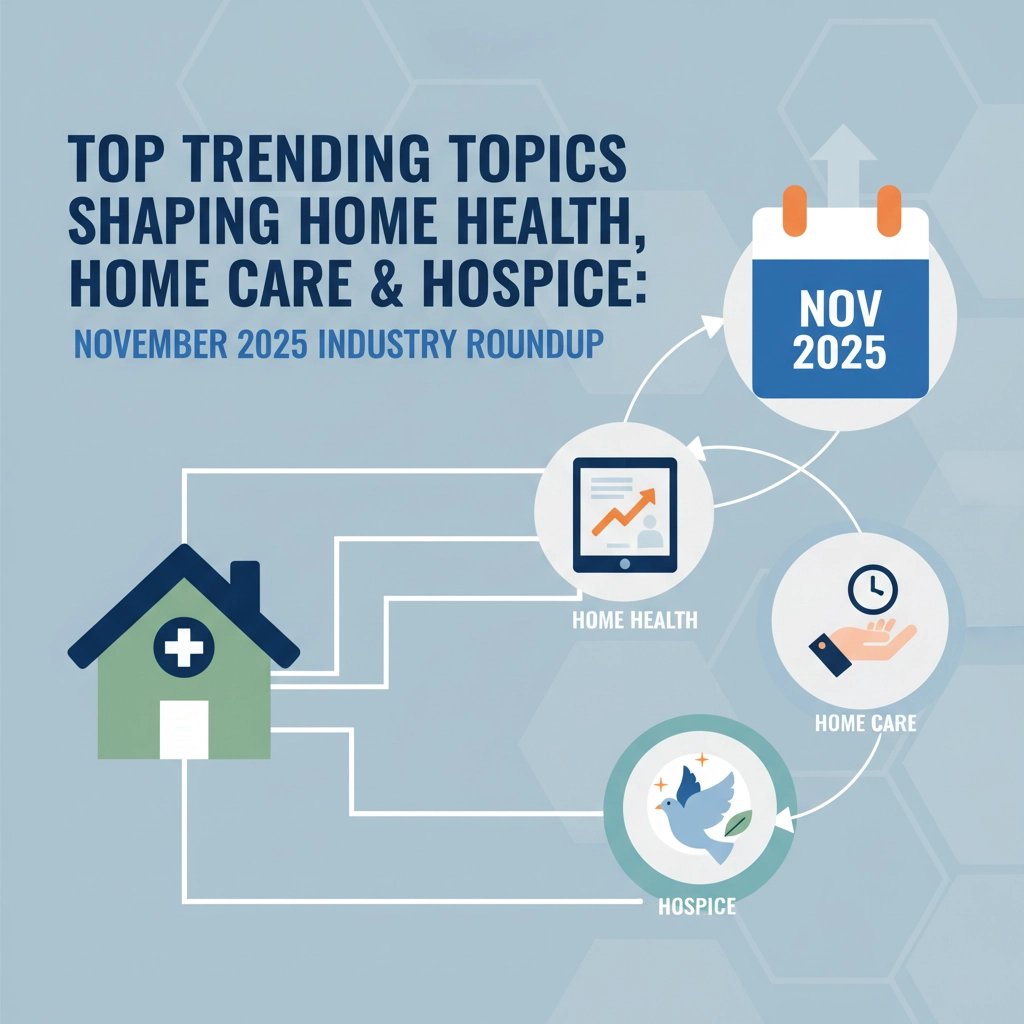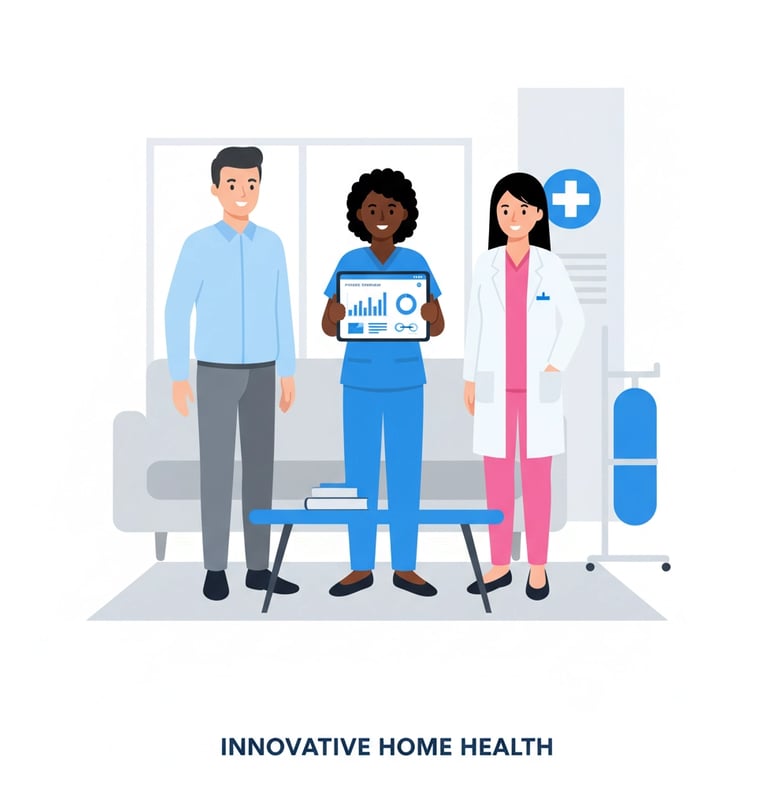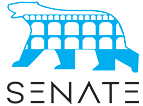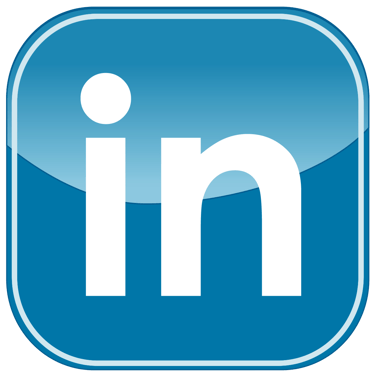Top Trending Topics Shaping Home Health, Home Care & Hospice: November 2025 Industry Roundup
Comprehensive analysis of the seven key trends reshaping home healthcare in November 2025, including workforce challenges, technology adoption, market growth, consolidation activity, and strategic implications for agency leadership.
11/6/20254 min read


The home healthcare industry is experiencing unprecedented change in November 2025. From explosive growth opportunities to persistent operational challenges, agency owners and executives are navigating a complex landscape that's reshaping how care is delivered across America. Whether you're running an established agency or considering strategic moves, understanding these trends is crucial for positioning your organization for success.
Workforce Crisis Reaches Critical Mass
The staffing shortage plaguing home healthcare has intensified dramatically this fall. According to Home Health Care News, high turnover rates driven by low wages and tough working conditions are fueling a projected 6.1 million job openings in the industry by 2034. This crisis is no longer just a hiring problem; it's an existential threat to agency operations and care quality. Read the full report.
Employment projections show the field growing 21% from 2023 to 2033, far outpacing most other sectors. However, the gap between caregiver supply and patient demand continues widening. Smart agencies are responding with creative retention strategies, competitive compensation packages, and enhanced benefits programs.
For agency owners considering exit strategies, this staffing crisis is creating interesting dynamics in valuations. Well-staffed agencies with proven retention programs are commanding premium multiples, while those struggling with turnover face challenging buyer conversations.


Technology Integration Accelerates Operations
Artificial intelligence and advanced technology platforms are now operational necessities for home healthcare agencies. According to Healthcare IT Today, AI is driving major advances in scheduling optimization, caregiver-patient matching, and real-time patient monitoring, all of which help agencies streamline care and improve outcomes. Read more about these technology trends.
Telehealth capabilities continue expanding beyond basic check-ins to include vital sign monitoring, medication management, and family communication platforms. Remote patient monitoring devices are enabling agencies to track heart rate, blood pressure, and other critical metrics from patients' homes, reducing emergency interventions and improving outcomes.
The agencies investing heavily in technology infrastructure today are positioning themselves as attractive acquisition targets for larger players seeking proven digital capabilities. This tech-forward approach is becoming a significant differentiator in M&A conversations.
Explosive Market Growth Drives Consolidation
Home healthcare spending is projected to grow at an impressive 7.1% annually from 2025 to 2026, outpacing hospitals and other sectors according to new CMS findings. This growth trajectory is attracting serious capital investment and driving consolidation activity across the sector. Read more.
Patient volumes are expected to increase 22% by 2034, creating massive expansion opportunities. The demographic drivers are undeniable: baby boomers aging in place, preference for home-based care, and healthcare cost containment efforts all point toward sustained demand growth.


Major consolidation continues despite regulatory scrutiny. The UnitedHealth-Amedisys merger remains under Department of Justice review with a December 31, 2025 deadline, highlighting how seriously regulators are examining large-scale combinations.
For independent and mid-size agencies, this consolidation wave presents both opportunities and challenges. Strategic positioning for eventual sale requires understanding what acquirers value most: geographic coverage, specialty services, technology capabilities, and proven financial performance.
Hospital-at-Home Programs Reshape Acute Care
The Hospital-at-Home model is experiencing remarkable expansion, with programs expected to double by 2026. Originally focused on basic monitoring, these programs now handle increasingly complex acute conditions traditionally requiring inpatient stays.
Medicare has extended waiver programs beyond their original December 2024 expiration, recognizing the model's potential to reduce healthcare costs while improving patient satisfaction. Industry estimates suggest up to $265 billion in Medicare services could shift to home settings by 2025.
This trend creates partnership opportunities between home health agencies and hospital systems. Agencies with clinical expertise in acute care management and technology capabilities for remote monitoring are becoming valuable strategic partners.
Financial Pressures Intensify Operational Demands
Despite robust demand growth, agencies face mounting financial pressures. Reimbursement challenges, regulatory compliance costs, and wage inflation are squeezing margins across the sector. The Medicare Home Health Prospective Payment System continues evolving, requiring agencies to adapt documentation and billing practices.
Independent agencies particularly struggle with regulatory infrastructure costs. Electronic health record implementations, quality reporting requirements, and compliance monitoring demand significant capital investment and operational expertise.
These financial realities are accelerating strategic decision-making. Agency owners are evaluating whether independent operation remains viable or if partnership or sale presents better long-term sustainability.
Personalized Care Becomes Competitive Differentiator
Today's patients and families expect customized care plans, flexible scheduling, and coordinated service delivery. Generic, one-size-fits-all approaches are losing market share to agencies offering personalized experiences and comprehensive care coordination.
Successful agencies are expanding service offerings to include outpatient therapy, mental health services, and specialized chronic disease management. This comprehensive approach improves patient outcomes while creating additional revenue streams and competitive moats.




For agencies considering strategic transitions, service diversification and care personalization capabilities are becoming critical valuation factors. Buyers want proven models for delivering comprehensive, coordinated care across multiple service lines.
Strategic Implications for Agency Leadership
The convergence of these trends creates both challenges and opportunities for agency owners and executives. The fundamental question facing leadership today: how do you capitalize on unprecedented growth demand while managing operational complexities and financial pressures?
Agencies thriving in this environment share common characteristics: technology-enabled operations, diversified service offerings, strong caregiver retention programs, and clear strategic vision. Those struggling often lack one or more of these elements.
For many owners, the optimal strategy involves positioning for strategic partnership or eventual sale to better-capitalized entities capable of scaling operations and navigating regulatory complexities. The key is understanding your agency's unique value proposition and timing market entry appropriately.
The home healthcare sector in November 2025 offers tremendous growth potential for well-positioned agencies while presenting existential challenges for those unprepared for industry transformation. Success requires strategic thinking, operational excellence, and often, difficult decisions about organizational structure and ownership.
Whether you're planning for continued independence, exploring strategic partnerships, or considering exit strategies, understanding these industry trends provides the foundation for informed decision-making in an increasingly complex healthcare landscape.
Unlock Your 30-Minute Agency Succession Review
Maybe you're ready to expand your reach, or perhaps it's time to consider your legacy and the future of your business. Either way, it all begins with a conversation. Schedule a confidential, no-obligation call to explore what the future might hold for you and your business.
Complete the form, and we'll reach out for a chat...


© 2025 SENATE HEALTHCARE LLC.
ALL RIGHTS RESERVED


